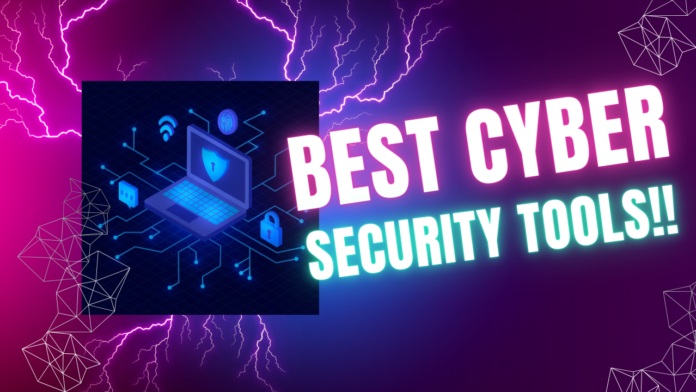In today’s digital age, cybersecurity has become a paramount concern for individuals and businesses alike. As cyber threats continue to evolve, the need for robust cybersecurity tools has never been more critical. This article explores the best cybersecurity tools to safeguard your digital life, ensuring your data and online activities remain secure.
Table of Contents
The Growing Importance of Cybersecurity
With the increasing reliance on digital platforms for work, communication, and entertainment, the potential for cyber-attacks has surged. Cybercriminals employ sophisticated techniques to breach systems, steal personal information, and disrupt services. Thus, cybersecurity is essential to protect sensitive data and maintain digital privacy.
Why You Need Robust Cybersecurity Tools
Effective cybersecurity tools provide a multi-layered defense against various threats, from viruses and malware to phishing attacks and data breaches. These tools not only protect your devices but also ensure the integrity and confidentiality of your information.
Antivirus Software
Importance of Antivirus Protection
Antivirus software is a fundamental component of cybersecurity. It detects, prevents, and removes malicious software, ensuring your devices remain virus-free. Without antivirus protection, your system is vulnerable to malware, which can cause significant damage.
Top Antivirus Programs
- Norton Antivirus: Known for its comprehensive protection and user-friendly interface.
- McAfee: Offers robust security features and real-time threat detection.
- Bitdefender: Provides advanced protection with minimal impact on system performance.
- Kaspersky: Recognized for its high detection rates and effective malware removal.
Firewalls
How Firewalls Work
Firewalls act as a barrier between your internal network and external threats. They monitor incoming and outgoing traffic based on predetermined security rules, blocking unauthorized access while allowing legitimate communications.
Best Firewall Solutions
- Cisco ASA: Offers advanced threat protection and network visibility.
- Palo Alto Networks: Known for its robust security features and ease of management.
- Fortinet FortiGate: Provides comprehensive security with high performance.
- Sophos XG Firewall: Combines firewall and antivirus features for enhanced protection.
Virtual Private Networks (VPNs)
Benefits of Using a VPN
A VPN encrypts your internet connection, masking your IP address and ensuring your online activities remain private. This is particularly important when using public Wi-Fi networks, which are often unsecured and vulnerable to attacks.
Leading VPN Services
- ExpressVPN: Offers high-speed connections and robust security features.
- NordVPN: Known for its strong encryption and no-log policy.
- CyberGhost: Provides user-friendly apps and reliable performance.
- Surfshark: Offers affordable plans with top-tier security.
Password Managers
The Need for Strong Passwords
Strong, unique passwords are crucial for protecting your online accounts. However, remembering multiple complex passwords can be challenging. Password managers securely store and generate strong passwords, simplifying account management.
Recommended Password Managers
- LastPass: Provides secure password storage and easy access across devices.
- 1Password: Offers strong encryption and user-friendly features.
- Dashlane: Known for its robust security and dark web monitoring.
- Keeper: Provides comprehensive password management and secure file storage.
Two-Factor Authentication (2FA)
Enhancing Account Security with 2FA
Two-factor authentication adds an extra layer of security to your accounts by requiring a second form of verification, such as a code sent to your phone. This makes it significantly harder for cybercriminals to gain unauthorized access.
Popular 2FA Tools
- Google Authenticator: Provides time-based verification codes for enhanced security.
- Authy: Offers multi-device support and backup features.
- Duo Security: Known for its user-friendly interface and robust protection.
- Microsoft Authenticator: Integrates seamlessly with Microsoft services and other platforms.
Encryption Tools
Protecting Your Data with Encryption
Encryption tools secure your data by converting it into unreadable code, accessible only with the correct decryption key. This ensures that even if your data is intercepted, it remains protected from unauthorized access.
Best Encryption Software
- VeraCrypt: Provides strong encryption for sensitive data.
- BitLocker: Integrated with Windows for seamless drive encryption.
- AxCrypt: Offers user-friendly file encryption for individuals and businesses.
- NordLocker: Combines encryption with cloud storage for enhanced security.
Secure Browsers
Importance of Secure Browsing
Using a secure browser helps protect against various online threats, such as phishing and malicious websites. Secure browsers prioritize user privacy and offer features that safeguard your online activities.
Top Secure Browsers
- Brave: Blocks trackers and ads by default, enhancing privacy.
- Mozilla Firefox: Offers robust security features and customizable privacy settings.
- Tor Browser: Routes traffic through multiple servers to anonymize your browsing.
- Google Chrome: Provides strong security features and frequent updates.
Anti-Phishing Tools
Recognizing and Preventing Phishing Attacks
Phishing attacks deceive users into providing personal information by masquerading as legitimate entities. Anti-phishing tools help identify and block these malicious attempts, protecting your sensitive data.
Effective Anti-Phishing Solutions
- PhishTank: Community-based platform for reporting and verifying phishing sites.
- Avira: Offers comprehensive protection against phishing and malware.
- Bitdefender: Provides real-time phishing protection and safe browsing features.
- Norton Anti-Phishing: Integrates with antivirus software for enhanced protection.
Backup Solutions
Importance of Regular Backups
Regular backups ensure that your data remains safe in case of system failures, cyber-attacks, or accidental deletions. Reliable backup solutions provide peace of mind by securely storing your data.
Recommended Backup Services
- Acronis True Image: Offers comprehensive backup and recovery options.
- Backblaze: Provides unlimited cloud backup for a flat fee.
- Carbonite: Known for its user-friendly interface and reliable backup features.
- IDrive: Combines online backup with secure file sharing.
Parental Control Software
Keeping Kids Safe Online
Parental control software helps monitor and manage children’s online activities, ensuring a safe digital environment. These tools block inappropriate content, set usage limits, and track online behavior.
Best Parental Control Tools
- Qustodio: Offers comprehensive monitoring and content filtering features.
- Net Nanny: Known for its user-friendly interface and effective controls.
- Kaspersky Safe Kids: Provides robust security features and real-time alerts.
- Norton Family: Integrates with other Norton products for enhanced protection.
Privacy Protection Tools
Maintaining Online Privacy
Privacy protection tools safeguard your personal information by preventing unauthorized tracking and data collection. These tools help maintain your online anonymity and protect against intrusive surveillance.
Top Privacy Protection Software
- Privacy Badger: Blocks trackers and enhances privacy.
- Ghostery: Provides detailed information about trackers and blocks them.
- DuckDuckGo Privacy Essentials: Enhances privacy by blocking trackers and encrypting connections.
- Avast Secure Browser: Offers built-in privacy and security features.
Mobile Security Apps
Securing Your Mobile Devices
Mobile devices are susceptible to various cyber threats, including malware and phishing attacks. Mobile security apps provide comprehensive protection to keep your devices safe.
Best Mobile Security Applications
- Lookout: Offers antivirus, anti-theft, and privacy protection features.
- McAfee Mobile Security: Provides robust protection against malware and data breaches.
- Norton Mobile Security: Known for its comprehensive security features and user-friendly interface.
- Avast Mobile Security: Offers malware protection, privacy features, and performance optimization.
Conclusion
Building a Comprehensive Cybersecurity Strategy
A robust cybersecurity strategy involves using a combination of tools to protect against various threats. By leveraging antivirus software, firewalls, VPNs, password managers, and other essential tools, you can ensure your digital life remains secure.
Final Thoughts
In an era where cyber threats are constantly evolving, staying proactive about your cybersecurity is crucial. Regularly updating your tools, staying informed about new threats, and adopting best practices will help you navigate the digital landscape safely.
FAQs
What is the most important cybersecurity tool?
There isn’t a single most important tool, as effective cybersecurity involves multiple layers of protection. Antivirus software, firewalls, and strong passwords are fundamental, but using a combination of tools is essential for comprehensive security.
Can free cybersecurity tools be trusted?
While some free cybersecurity tools offer reliable protection, they often come with limitations. Premium tools typically provide more comprehensive features, regular updates, and better support. It’s essential to research and choose reputable free tools if you decide to use them.
How often should I update my cybersecurity tools?
Regular updates are crucial for maintaining effective protection. Cyber threats constantly evolve, and updates ensure your tools can defend against the latest threats. Enable automatic updates whenever possible and check for updates regularly.
Are cybersecurity tools enough to protect me online?
While cybersecurity tools provide essential protection, they are not foolproof. Safe browsing habits, regular data backups, and staying informed about potential threats are also critical components of a comprehensive cybersecurity strategy.
What should I do if I think I’ve been hacked?
If you suspect a cyber attack, disconnect your device from the internet immediately. Run a full antivirus scan, change your passwords, and monitor your accounts for suspicious activity. Contact a cybersecurity professional if necessary and report the incident to relevant authorities.

